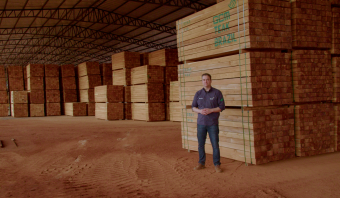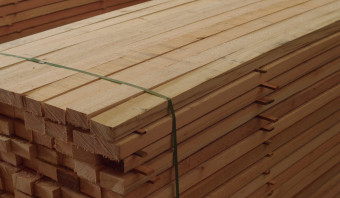06 de agosto de 2024

In the sixth episode of the WoodFlow Podcast, the central theme was the sustainable exploitation of tropical and native woods in Brazil.
"The path to preserving the Amazon, to preserving our native forests, is to invest in sustainable forest management and encourage the consumption of wood from conscious and responsible management." This statement comes from the President of the Association of Wood Exporting Industries of the State of Pará (AIMEX), Deryck Martins, who was one of the interviewees in the sixth episode of the WoodFlow podcast, which airs on Monday, August 5.
The conversation, led by WoodFlow CEO Gustavo Milazzo, also featured the head of Strategic Development at STCP, Marcelo Wiecheteck, and provided a very positive outlook for the native wood market, its challenges, and opportunities.
Tropical Wood Market
According to Marcelo, the international market for tropical wood (wood originating in regions between the Tropics of Cancer and Capricorn) is about 25 billion dollars per year. Brazil holds a small share of this market, around 1 million dollars.
"Currently, Brazil has a small slice of this market but once had a significant participation, reaching more than 50% of the international market. However, this does not mean we have reduced our export volumes. In fact, while we maintained the same volume levels, other countries entered this expanding market and gained more space," Marcelo explained.
Deryck added that among the main exported products are wood for flooring and decks, with the primary consumer being the United States, followed by Europe and Asia. However, he highlighted that only 15 to 17% of what is produced in Brazil is exported. The largest consumer of Brazilian tropical wood is still the domestic market.
Challenges and Opportunities
Both interviewees emphasized that Brazil already has efficient tools for tracking and controlling the exploitation of tropical or native wood. However, there is still a need to advance initiatives for sustainable forest management to gain more market space.
According to Deryck, forest management initiatives in public areas, known as forest concessions, are progressing well. "However, it is still necessary to advance in the management of private areas to not only encourage the maintenance of standing forests but also allow for the extraction of timber and non-timber forest products," he highlighted.
Forest management of native forests in Brazil occurs as follows: for every hectare (equivalent to a football field), it is estimated that there are 600 to 700 trees. In this hectare, only five trees are removed, and for each species removed, at least three individuals of the same species must be left in that area.
"Today, it is already proven that a managed forest remains healthy for longer. Additionally, when it comes to carbon, with management, you increase the carbon stock in that forest, as mature trees are removed and regeneration is stimulated," Deryck pointed out.
Here lies the great opportunity for the sustainable exploitation of native forests: scalability. According to Marcelo, about 50% of Brazil's territory is native forest. So, while the exotic wood market (pine and eucalyptus) faces uncertainties regarding the long-term supply of raw materials, native wood is already ready for harvest, of course, under the aforementioned management perspective. "If the country develops policies that support sustainable exploitation, we can capture a significant share of the market."
As mentioned at the beginning of this text, stimulating the consumption of wood from sustainable management is one way to pressure for more initiatives to consciously exploit Brazilian forests. And knowledge is the key to curbing deforestation and promoting forest maintenance. Listen to this and much more in the sixth episode of the WoodFlow podcast.
About the WoodFlow Podcast
The WoodFlow Podcast is an initiative of the wood export startup WoodFlow, aiming to discuss the wood market once a month. WoodFlow CEO Gustavo Milazzo conducts the interviews, always portraying the scenario and the future of wood. The WoodFlow Podcast is the first in the country to discuss wood market topics and can be accessed directly on YouTube or audio streaming platforms.
Posts Relacionados

09 de dezembro de 2025

